Key takeaways:
- Distribution deals serve as a critical link between creators and audiences, emphasizing the importance of understanding contract nuances to avoid costly misinterpretations.
- Key player roles include producers, distributors, sales agents, and marketing teams, each essential for successful collaboration and project execution.
- Negotiating terms requires flexibility and open communication to foster mutually beneficial partnerships and to craft tailored deals that cater to both parties’ strengths.
- Common pitfalls include overlooking contract details, misaligning with distributor goals, and poor communication, highlighting the need for thoroughness and clarity in partnerships.
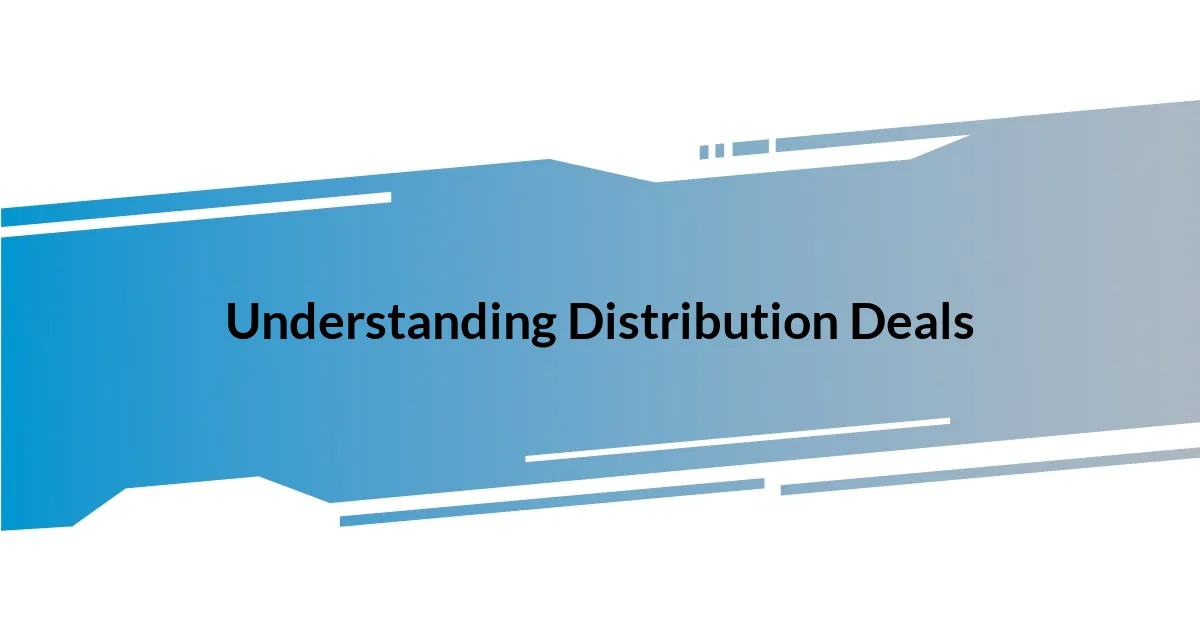
Understanding Distribution Deals
When I first delved into distribution deals, I realized they are the bridge between creators and audiences. This realization hit me hard during a conversation with a filmmaker who almost lost out on a lucrative deal simply because he didn’t grasp the nuances of the contract. It’s fascinating how a single misinterpretation can alter the entire trajectory of a project.
Understanding the core elements of distribution deals can feel daunting, especially for newcomers. I remember sifting through a stack of contracts, feeling overwhelmed by the legal jargon. Have you ever faced a similar situation? It’s crucial to break down the complexities. Knowing terms like “territory,” which defines the geographical area where rights apply, can make all the difference in negotiations.
Moreover, I’ve learned that a good distribution deal should reflect a partnership rather than a one-sided transaction. In my experience, building a relationship with distributors often led to more favorable terms. It’s about aligning visions—how has your perspective on this changed? Understanding distribution deals isn’t just about what you gain but also about collaboration and shared goals.
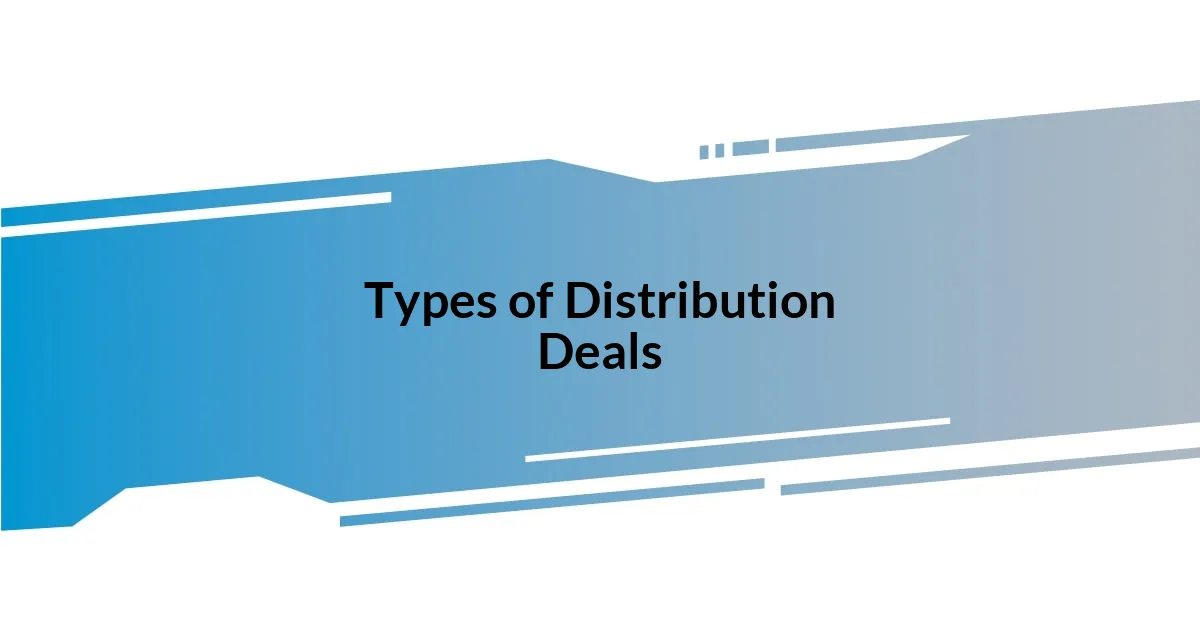
Types of Distribution Deals
When exploring types of distribution deals, I quickly discovered that they can vary significantly based on rights, territory, and duration. For instance, I fondly recall my first negotiation experience when I was thrilled to secure a multi-territory deal for my project, allowing it to reach broader international audiences. This deal not only amplified the film’s visibility but also enriched my understanding of global markets—a lesson that remains invaluable today.
Here’s a brief overview of the primary types of distribution deals:
- Theatrical Distribution: This involves the release of a film in cinemas, typically requiring significant marketing efforts and upfront costs.
- Digital Distribution: Here, films are distributed via online platforms, which is increasingly popular and often involves lower overhead.
- Broadcast Distribution: This includes agreements with television networks to air content, whether via traditional cable or streaming services.
- Home Entertainment: These deals cover physical media like DVDs and Blu-rays, as well as digital rentals and purchases.
- International Distribution: Aimed at overseas markets, these agreements can differ greatly due to varying cultural preferences and regulations.
Each type comes with its own set of challenges and opportunities, and understanding them can truly reshape a project’s potential success.
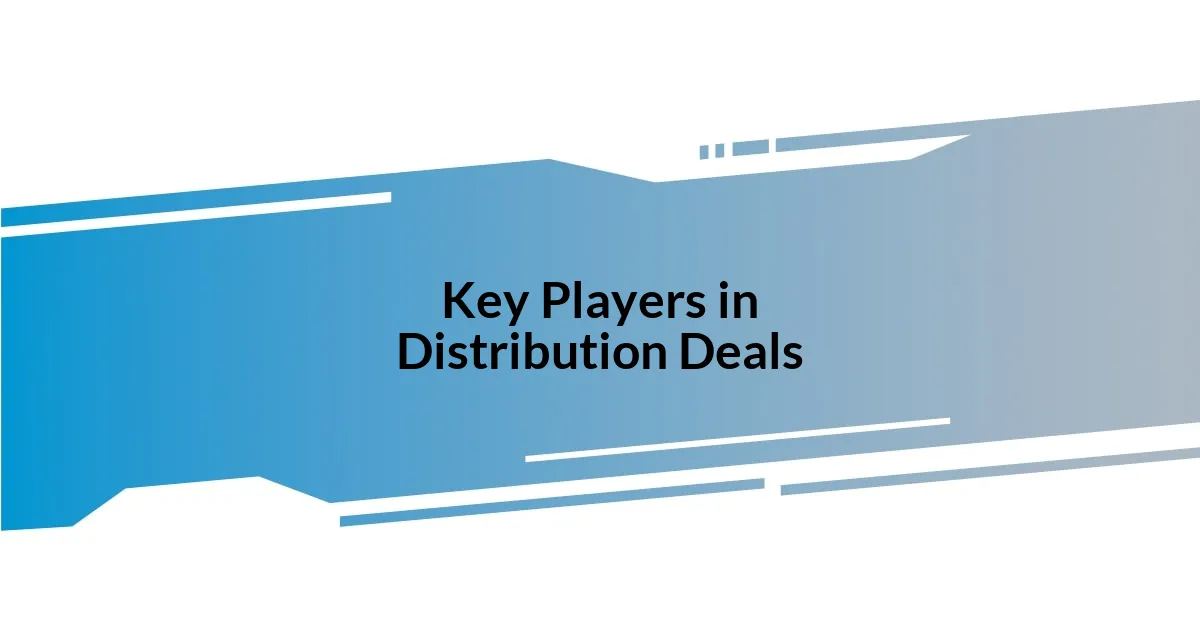
Key Players in Distribution Deals
When I reflect on the key players in distribution deals, I notice that they range from producers and distributors to sales agents and even marketing teams. I remember sitting in a room full of industry veterans and feeling the palpable energy as we discussed various strategies. This was eye-opening; each player has a distinct role yet must collaborate seamlessly to bring a project to life.
Distributors are often the backbone of the operation, holding the power to shape a film’s release. I learned this firsthand when a distributor I was working with provided insights that elevated our marketing approach, leading to a successful opening weekend. Have you ever realized how vital their experience can be? The right distributor not only helps navigate the complexities of the market but also amplifies a film’s reach through established networks.
On the other hand, sales agents play a pivotal role, acting as intermediaries who secure the best deals. I encountered one who had an extensive network at film festivals, and his ability to connect us with potential buyers made a world of difference. It reinforced my understanding that these players are not just negotiators but also connectors who can turn ideas into opportunities.
| Key Player | Role |
|---|---|
| Producers | Oversee production and initial negotiations. |
| Distributors | Manage distribution strategy and marketing. |
| Sales Agents | Secure deals and connect producers with buyers. |
| Marketing Teams | Develop marketing strategies to promote the release. |
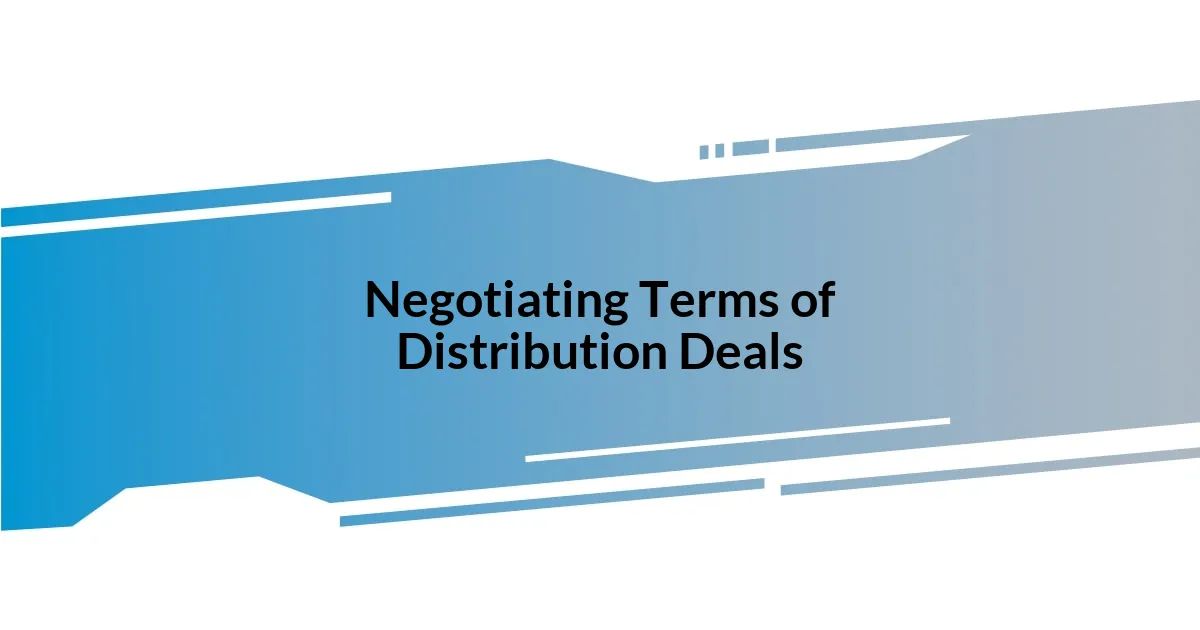
Negotiating Terms of Distribution Deals
Negotiating the terms of distribution deals can feel like navigating a complex maze, especially when you’re passionate about your project. I remember one negotiation where I felt excitement and anxiety mingling in the air, as we haggled over revenue shares. It struck me how every percentage point could significantly impact the project’s overall success. Have you ever debated whether to take a smaller cut for broader visibility? It’s a tough call.
One essential aspect I’ve learned is the importance of flexibility. I once faced a staunch distributor insisting on a rigid contract, but I found that proposing alternative terms actually led to a better outcome for both parties. It made me realize that open-mindedness not only fosters collaboration but can also open doors for creative solutions. Trust me, don’t shy away from asking questions during these talks; it’s all about finding that sweet spot that works for everyone involved.
Understanding the specific needs of both sides can make a world of difference. During one particularly memorable negotiation, I focused on the distributor’s previous successes in similar markets. This shared insight allowed us to craft a deal tailored to mutual strengths, leading us to celebrate a launch that exceeded our expectations. When you approach negotiations with empathy and knowledge, you set the stage for not just a successful deal, but for a lasting partnership as well.
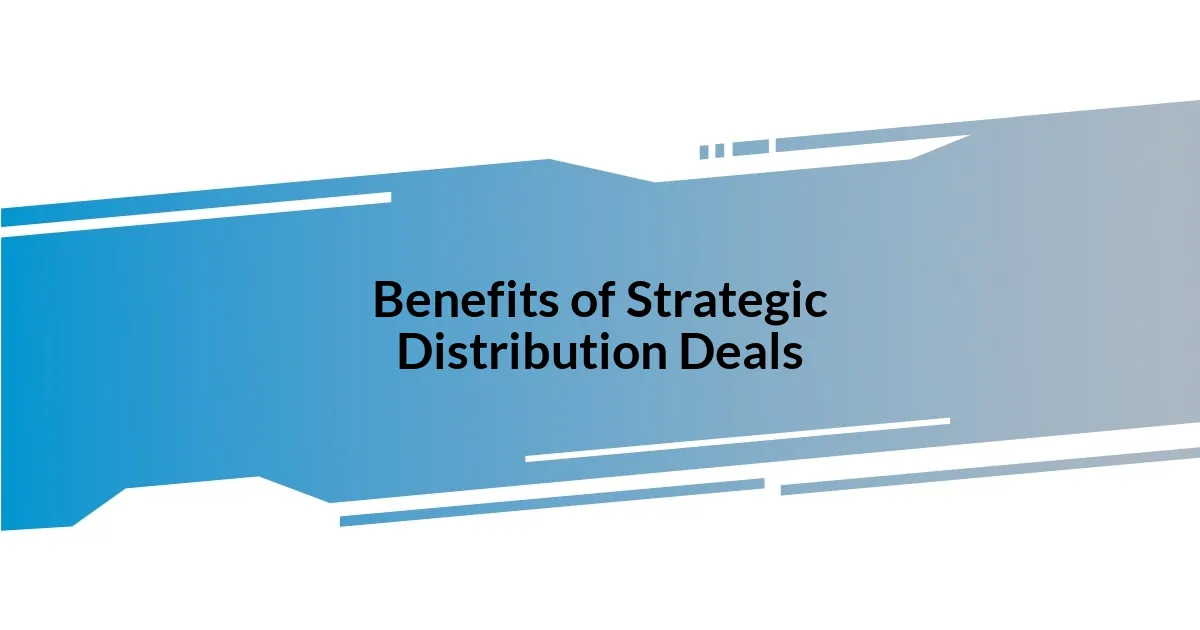
Benefits of Strategic Distribution Deals
Strategic distribution deals offer many benefits, particularly in enhancing market reach. I recall a project where, after signing with a distribution partner, our visibility increased significantly. Suddenly, we weren’t just presenting our work at local festivals; we were now part of larger conversations at international markets. Isn’t it fascinating how one partnership can broaden your horizons?
Another advantage is the leverage that comes from pooled resources. In one instance, my team partnered with a distributor who had an established marketing budget. Their investment allowed us to create a vibrant promotional campaign that we could never have funded on our own. It struck me how, sometimes, collaboration opens doors that sheer effort cannot. Have you ever faced limits due to budget constraints?
Moreover, strategic deals often provide valuable insights into consumer behavior. Working closely with a distributor, I gained access to data about our audience’s preferences, which ultimately guided our future projects. It’s pretty enlightening—knowing what resonates with viewers can help artists refine their visions. How often do we miss out on vital feedback simply because we’re not connected to the right industry players? Having that information has been a game-changer for my approach and creative decisions.
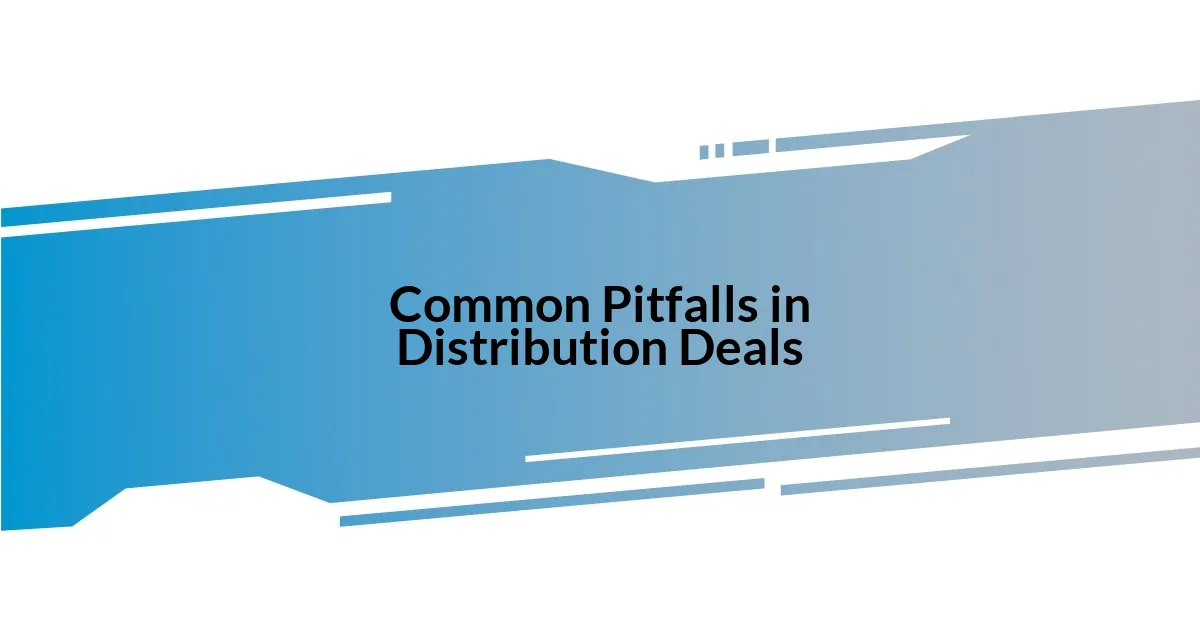
Common Pitfalls in Distribution Deals
One common pitfall I’ve encountered in distribution deals is the tendency to overlook the fine print. During one negotiation, I was so eager to seal the deal that I skimmed through the contract. Unfortunately, I found out later about hidden fees that ate into our profits. Have you ever felt the rush of excitement overshadow your attention to detail? It’s a stark reminder of how critical it is to fully understand every clause before signing.
Another mistake is assuming that a distributor’s reputation guarantees success. I learned this the hard way with a well-known distributor who had impressive credentials but didn’t align with my project’s vision. I remember the disappointment when our product didn’t resonate with their audience. It highlighted for me the importance of selecting a partner who not only has a solid reputation but also shares your artistic goals. Have you evaluated how well your vision aligns with your distribution partner’s before jumping into a contract?
Communication is often underestimated, too, and I’ve seen its impact firsthand. In one case, a lack of clarity about timelines led to confusion and delays in our project launch. I realized that proactive communication could have mitigated those issues significantly. Have you ever faced misunderstandings simply due to not being on the same page? I now make it a point to establish clear channels for ongoing dialogue, ensuring that everyone involved is on the same journey toward success.
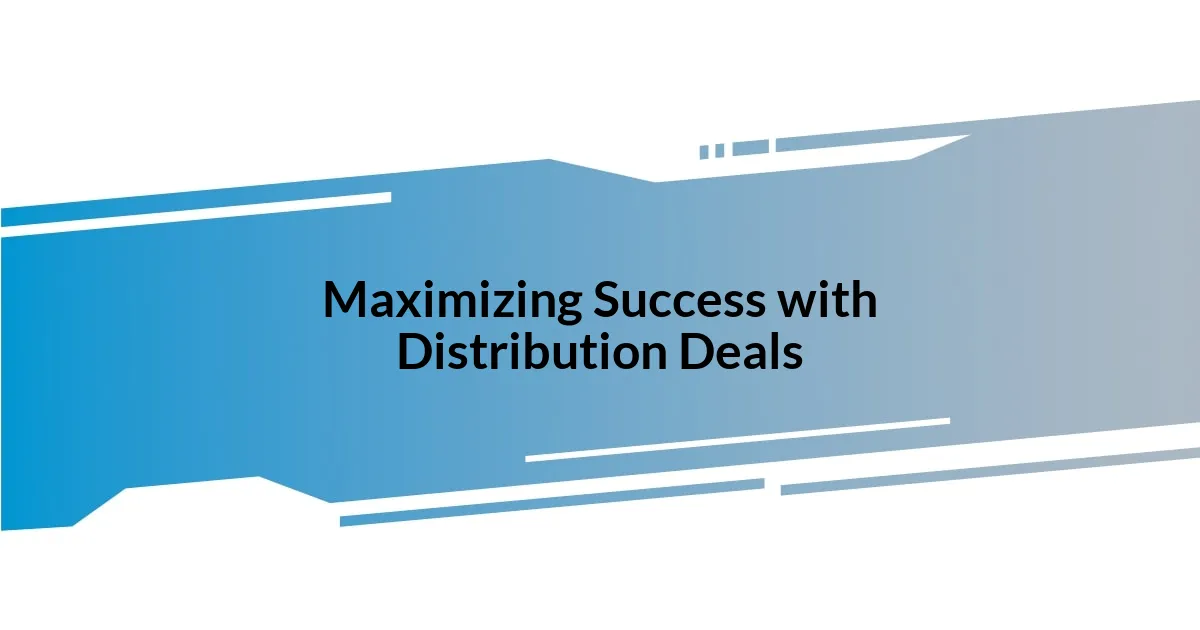
Maximizing Success with Distribution Deals
Establishing clear expectations from the start is crucial for maximizing the success of distribution deals. I remember a time when my team didn’t outline our goals clearly, leading to mixed messages down the line. This oversight resulted in delays and a frustrating scramble to align our priorities. Have you ever felt like you were racing in different directions? It’s essential to sit down together, lay out visions, and ensure everyone is rowing in the same direction from the outset.
In my experience, fostering a collaborative relationship with your distributor can create a wealth of opportunities. I was pleasantly surprised when a distributor I initially saw as just a partner turned into a brainstorming ally. We had regular check-ins, which inspired innovative marketing strategies that we hadn’t considered before. Don’t you think that synergy can sometimes lead to breakthroughs you didn’t even realize were possible? Engaging in open discussions can foster creativity and lead to significant benefits.
Finally, it’s vital to assess and adapt your strategies based on success metrics. After launching our project, we closely analyzed the distribution results, discovering certain channels worked significantly better than others. I felt a sense of empowerment knowing we could pivot to focus more on what was actually delivering results. Reflecting on outcomes is key—are you looking at the numbers and adjusting your plans to maximize them? Making informed decisions can set you up for even greater achievements in future deals.